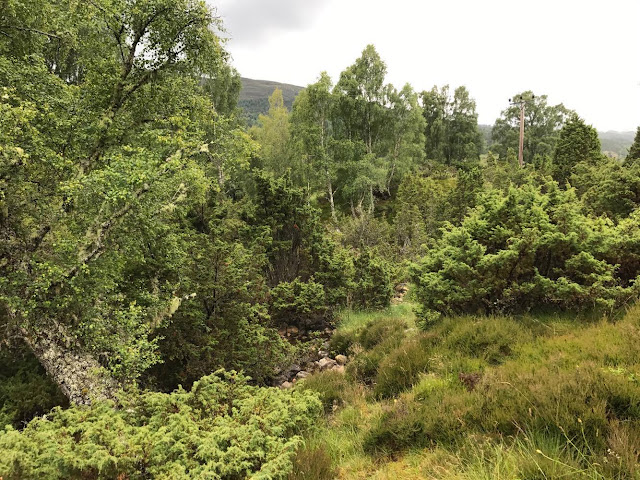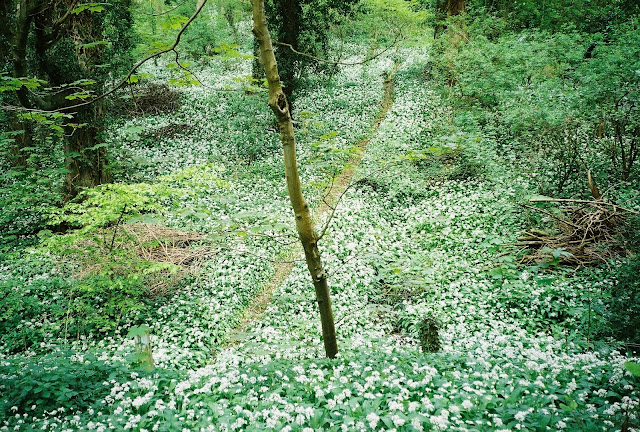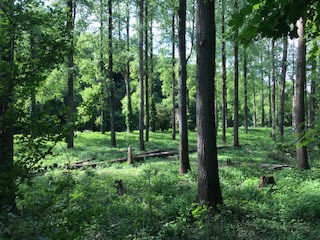European Rewilding for More than the Wealthy
Longhorn Cattle Grazing at Knepp Estate, West Sussex, 2017 (Photo Author's Own)
Rewilding
at its core is letting nature ‘get on with it.’ Much conservation & land
management involves a huge amount of human meddling and intrusion and tends to
maintain a ‘wilderness’ that is merely traditionally and aesthetically accepted.
Nature has all of the necessary components in-built, but humans have altered
these workings to the point that certain essential species have become extinct
or extirpated (total removal of a species from an area) from countries that now
have an impoverished wilderness. If we reintroduce some of these species we
could spark a chain reaction that enriches wildlands. The most heavily cited success
is the reintroduction of wolves to Yellowstone National Park in 1994. (Farquhar)
The wolves keep deer numbers in check by hunting the slowest and weakest of the
herd, and keep them on the move by making deer wary of wolf pack movements,
allowing heavily browsed & foraged plants the chance to recover, grow, and
spread, giving rise to all manner of habitats; trees grow and cool rivers in
their shade giving fish safe havens (essential with impending climate rises);
beavers and small mammals have clustered forests to shape and dwell in; all
manner of insect and microbiological life are given diverse organic matter from
spreading plant life to wolf-kill carcasses to feast upon and digest in the
nutrient cycle.
As a concept in conservation it
is quite radical and challenges many accepted rules and ideas, yet it is
gaining considerable traction nowadays. However, I still feel that writings on
rewilding snag on a core issue that never really gets addressed, especially by
the pro-rewilding community; will rewilding effect the worst off in society?
In Britain, things are looking up for rewilding
despite not having the benefit of sharing land borders with countries that have
other species, leaving hope for migration across those borders Beavers have
been reintroduced into the Forest of Dean by the government, after years of
scatty decision making about unofficial releases in Devon and Scotland. Lynx
look set to be released into the Kielder forest, while wolves slowly spread
across continental Europe, re-entering many of their previous homelands. Although
human history has put pressures on wilderness everywhere, it thrives strongest
outside of Europe; although with its share of endangerment. Africa, Asia, the
Americas and Australia all boast some level of healthy and free flowing
wilderness. Caroline Fraser casts a broad eye over how rewilding has been
interpreted and implemented across the globe in her text Rewilding the World.
In Britain,
rewilding has received calls of classism; Simon Fairlie called Knepp Estate in
West Sussex a “rich man’s playground” as Charlie Burrell, its owner, inherited
the estate from his wealthy, land-owning ancestors, replete with both a ruined
and a livable castle. (Fairlie) Similarly, Paul Lister, an estate owner in
Scotland, wants to release wolves into fenced off grounds, drawing the ire of
The Ramblers, who support reintroductions, but feel that “if wolves justify fencing in land, they could
become the guard dogs of the very rich, allowing estate owners to subvert the
Right to Roam.”(Weymouth) Land Ownership in Britain is a particularly
contentious issue, as we still have a dense and unequal distribution of
ownership, causing particular problems in Scotland with vast shooting grounds
and estates for often absent landowners. Despite this, Scotland supports a
number of rewilding projects, including those run by the organisation “Trees
For Life.” Any future security and success rewilding could have will be held
back by continued criticism for opening exciting opportunities exclusively to wealthy
and cultured urbanites. These are some core issues that I believe need unpacking
for rewilding to blossom into a universally beneficial conservation movement
for British, European, and global wildlife, and the humans that could live
alongside it.
Woodlands Edge at Dundreggan Conservation Estate, Scottish Highlands, 2017
(Photo Author's Own.)
Cost-Free Entry
Most
rewilding sites I’ve heard of are free to enter, as most parks are. I have
personally visited Knepp Estate in West Sussex and Trees For Life’s site in the
Highlands, Dundreggan Conservation Estate, and been charged nil for entry. To
me, rewilding is immediately stunted if contained and trickle-fed to the
public. This is commonly called a ‘Zoo.’ Wilderness needs to be able to spread;
wolves protected in Europe have astounded all by spreading healthily across the
continent, while wolves reintroduced into Yellowstone National Park have
travelled some 500 miles. By eliminating a cost barrier at entry, rewilding
sites dramatically increase their ability to spread word of their good work
through first hand experiences. Unfortunately, most of these sites are remotely
located, and so many would struggle to initially get there. If school trips or
bus routes could be arranged, the public might get a taste and strive to return
in future. Or, leading onto my next point, rewilding could be brought to the
masses at home.
Urban Inclusion
When we hear news about leopards
skulking in the outskirts of Mumbai or wolves on their long trek through Europe
encroaching on the suburbs of Berlin, we are immediately shocked that they
should come near cities. We do not think that really, cities have come near
them. Like all things artificial, geological, and organic, cities are just part
of the landscape, and thus not exempt from natural encroachment. Obviously a
rich-poor divide exists in the countryside, but it is much more pronounced in
the urban environment where class segregation is much more obvious and
condensed. Cities would thus be great sites for urban rewilding experiments,
providing havens for the myriad hidden creatures that make homes and pathways
of cities, while establishing exciting examples of rewilding in easy proximity
of poorer families and individuals. Many city councils have already
incorporated relaxed grass cutting in certain parks as a result of pressure
from funding cuts.
Farming and Food
Security
This is a big one, and is
getting pushed into the shadows in rewilding discourse. Pro-rewilders such as George
Monbiot have made intense critiques of modern British farming, drawing
attention to the economic failures of the market and the subsidy system. (Monbiot)
I completely agree that farming needs drastic restructuring, but also feel that
wiping out food production is extremely detrimental, putting the worst off at
risk, as always. Nick Cohen wrote a piece in the Guardian in 2016
titled “I’m Sorry If Rewilding Hurts Farmers, But We Need It.” (Cohen) Personally
I find this entirely unhelpful, especially seeing as the majority of rewilding
projects occur in rural areas where a relationship with local farmers would be
productive. Cohen suggests that it was the Neolithic invention of farming that
sparked current wilderness depletion. (Cohen) Much more recently was the unfair
seizure of land across Britain from peasants and landworkers, from lands in
England that were turned into pompous hunting grounds and more recently
clearances of smallholders in Wales and especially Scotland, where the wound is
still very much raw. In a future where the rich can afford to eat, already
struggling farmers have been forced off their land, and everyone wonders why
the country is incapable of feeding its own populace healthily and properly,
rewilded sites would be at risk of mirroring these ancient feudal estates
reserved for upper class leisure and access. If rewilding could be worked into
an ecologically minded farming system, we could have a future-proof landscape
that might even heal many years of environmental degeneration.
Opportunities Outside
of Tourism and Service
I’d love to
live in some goo-goo land where movements that ensure a biodiverse and green
future go unhindered by the economy. Alas, the world is different. Rewilding occurs
all the time by land just being forgotten about, but with land in high demand
by a number of industries it is unlikely something long-term and substantial
could happen without economic long-term planning. More often than not rewilding
looks to the tourism sector for this security. Knepp Estate in West Sussex
offers catered camping and ‘wildlife safari’ experiences, while companies offer
tours or ‘safaris’ of rewilded sites throughout Europe. These are great ideas,
and probably something I myself might pay for one day. My gripe with it is that
many people would never have the money to get in touch with rewilding sites in
such a way. Even should they secure a paid role involved in rewilding, it is likely
to be in the service end, rather than the hands-on ecology side of things often
filled with middle-class, highly-educated, white men. It is understandable that
technical work be filled by those who have undertaken intense study of the
subject, but there must be a way to get those who didn’t have the same educational
opportunities to enter into this sector in a meaningful role and career. Keeping
the masses in service to the lucky upper class in their leisure forays looks
unfittingly mundane in contrast with the radical nature of rewilding.
Works Cited:
Cohen, Nick. “I’m Sorry if Rewilding Hurts Farmers, But We Need It.” The
Guardian (2016)
<www.theguardian.com/commentisfree/2016/sep/03/rewilding-countryside-national-trust>
Fairlie, Simon. “Rewilding and Food Security.” The Land 14 (2013)
<thelandmagazine.org.uk/articles/rewilding-and-food-security>
Farquhar, Brodie. “Wolf
Reintroduction Changes Ecosystem.” Yellowstone
National
Park. <http://www.yellowstonepark.com/wolf-reintroduction-
changes-ecosystem/>
Monbiot, George. Feral: Rewilding the Land, Sea and Human
Life. (London:
Penguin, 2014)
Weymouth,
Adam. “The Place Where Wolves Could Soon Return.” BBC Magazine
(2015) <bbc.co.uk/news/magazine-33017511>





Comments
Post a Comment